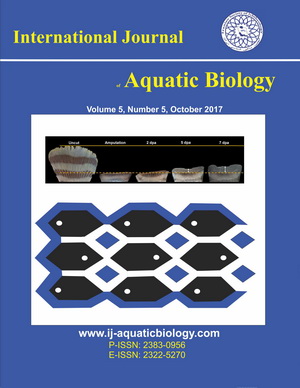Anesthesia of juvenile Persian sturgeon, Acipenser persicus; Borodin 1897, by peppermint, Mentha piperita, extract – Anesthetic efficacy, stress response and behavior
Downloads
Downloads
Auperin B., Baroiller J.F., Ricordel M.J., Fostier A., Prunet P. (1997). Effect of confinement stress on circulating levels of growth hormone and two prolactins in freshwater adapted Tilapia (Oreochromis niloticus). General and Comparative Endocrinology, 108: 35-44.
Bagheri T., Imanpour M.R. (2011). The efficacy, physiological responses and hematology of Persian sturgeon Acipenser persicus, to clove oil as an anesthetic agent. Turkish Journal of Fisheries and Aquatic Sciences, 11: 477-483.
Benovit S.C., Gressler L.T., de Lima Silva L., de Oliveira Garcia L., Okamoto M.H., dos Santos Pedron J., Sampaio L.A., Rodrigues R.V., Heinzmann B.M., Baldisserotto B. ( 2012). Anesthesia and transport of brazilian flounder, Paralichthys orbignyanus, with essential oils of Aloysia gratissima and Ocimum gratissimum. Journal of World Aquaculture Society, 43: 896-900.
Boijink C.L., Maciel P.O., Tavares-Dias M., Iwashitab M.K.M., Morais M.S., Hidee D.M.V., Souza S.C., Couto M.V.S., Meneses J.O., Cunha F.S., Fujimoto R.Y. (2017) Anesthesia by sprinkling method in the gills of tambaqui Colossoma macropomum does not influence intensity and morphology of monogeneans. Brazilian Journal of Biology, 77(2): 367-371.
Chaieb K., Hajlaoui H., Zmantar T., Kahla-Nakbi A.B., Rouabhia M., Mahdouani K., Bakhrouf A. (2007). The chemical composition and biological activity of clove essential oil, Eugenia caryophyllata (Syzigium aromaticum L. Myrtaceae): a short review. Phytotherapy Research, 21: 501-506.
Clark R.J., Menary R.C. (1981). Variations in composition of peppermint oil in relation to production areas. Economic Botany, 35: 59-69.
Eagderi S., Mojazi Amiri B., Adriaens D. (2013). Description of the ovarian follicle maturation of the migratory adult female bulatmai barbel (Luciobarbus capito, Gí¼ldenstädt 1772) in captivity. Iranian Journal of Fisheries Sciences, 12(3): 550-560.
Faí§anha M.F., Gomes L.D.C. (2005). Efficacy of menthol as an anesthetic for tambaqui (Colossoma macropomum, Characiformes: Characidae). Acta Amazon, 35: 71-75. (In Spanish with English abstract)
Faheem M., Jahan N., Lone K.P. (2016). Histopathological effects of biofenol-A on liver, kidney, and gills Indian major carp, Catla catla (Hatmilton, 1822). The Journal of Animal and Plant Sciences, 26(2): 514-522.
Geng Y., Liu J., Lv R., Yuan J., Lin Y., Wang X. (2007). An efficient method for extraction, separation and purification of eugenol from Eugenia caryophyllata by supercritical fluid extraction and high-speed counter-current chromatography. Separation and Purification Technology, 57: 237-241.
Gressler L.T., Riffel A.P.K., Parodi T.V., Saccol E.M.H., Koakoski G., Costa S.T.D., Pavanato M.A., Heinzmann B.M., Caron B., Schmidt D., Llesuy S.F., Barcellos L.J. G., Baldisserotto B. (2014). Silver catfish Rhamdia quelen immersion anaesthesia with essential oil of Aloysia triphylla (L'Hérit) Britton or tricaine methanesulfonate: effect on stress response and antioxidant status. Aquaculture Research, 45(6): 1061-1075.
Holloway A.C., Keene J.L., Noakes D.G., Moccia R.D. (2004). Effects of clove oil and MS-222 on blood hormone profiles in rainbow trout Oncorhynchus mykiss, Walbaum. Aquaculture Research, 35: 1025-1030.
Hoseini S.M., Hosseini S.A., Jafar Nodeh A. (2010). Serum biochemical characteristics of Beluga, Huso huso (L.), in response to blood sampling after clove powder solution exposure. Fish Physiology and Biochemistry, 37: 567-572.
Hoseini S.M., Rajabiesterabadi H., Tarkhani R. (2015). Anaesthetic efficacy of eugenol on iridescent shark, Pangasius hypophthalmus (Sauvage, 1878) in different size classes. Aquaculture Research, 46(2): 405 -419.
Hoseini, S.M., Hosseini S.A. (2010). Effect of dietary L-tryptophan on osmotic stress tolerance in common carp, Cyprinus carpio, juveniles. Fish Physiology and Biochemistry, 36: 1061-1067.
Kasai M., Hososhima S., Yun-Fei L. (2014). Menthol induces surgical anesthesia and rapid movement in fishes. Open Neuroscience Journal, 8: 1-8.
McKay D.L., Blumberg J.B. (2006). A review of the bioactivity and potential health benefits of peppermint tea (Mentha piperita L.). Phytotherapy Research, 20: 619-633.
National Research Council. (1994). Institute for marine biosciences annual report: 1993-1994. Institute for Marine Biosciences, Ottawa. 47 p.
Padiyoor B.A., Benno F., Pereira Jayaprakas V. (2017). Assessment of clove oil and Benzocaine Anaesthesia on Haematological and Histopathological profile of Haludaria fasciata. Journal of Biodiversity and Environmental Sciences, 10(4): 27-37.
Park M.O., Hur W.J., Im S.Y., Seol D.W., Lee J., Park I.S. (2008). Anaesthetic efficacy and physiological responses to clove oil-anaesthetized kelp grouper Epinephelus bruneus. Aquaculture Research, 39: 877-884.
Park M.O., Im S.Y., Seol D.W., Park I.S. (2009). Efficacy and physiological responses of rock bream, Oplegnathus fasciatus to anesthetization with clove oil. Aquaculture, 287: 427-430.
Pittler M.H., Ernst E. (1998). Peppermint oil for irritable bowel syndrome: a critical review and metaanalysis. American Journal of Gastroenterology, 93: 1131-1135.
Roberts R.J. (2012). Fish Pathology, 4th Edition. Wiley-Blackwell. 590 p.
Rohloff J., Dragland S., Mordal R., Iversen T.H. (2005). Effect of harvest time and drying method on biomass production, essential oil yield, and quality of peppermint (Mentha piperita L.). Journal of Agricultural and Food Chemistry, 53: 4143-4148.
Roohi Z., Imanpoor M.R. 2015. The efficacy of the oils of spearmint and methyl salicylate as new anesthetics and their effect on glucose levels in common carp (Cyprinus carpio L., 1758) juveniles. Aquaculture, 437: 327-332.
Roubach R., Gomes L.C., Fonseca F.A.L., Val A.L. (2005). Eugenol as an efficacious anesthetic for tambaqui, Colossoma macropomum (Cuvier). Aquaculture Research, 36: 1056-1061.
Sang J.P. (1982). Estimation of menthone, menthofuran, menthylacetate and menthol in peppermint oil by capillary gas chromatography. Journal of Chromatography, 253: 109-112.
Soto C.G., Burhanuddin C.G. (1995). Clove oil as a fish anaesthetic formeasuring length and weight of rabbitfish (Siganus lineatus). Aquaculture, 136: 149-152.
Stehly G.R., Gingerich W.H. (1999). Evaluation of AQUI-S (efficacy and minimum toxic concentration) as a fish anaesthetic/sedative for public aquaculture in the United States. Aquaculture Research, 30: 365-372.
Summerfelt R.C., Smith L.S. (1990). Anesthesia, surgery, and related techniques. In: C.B. Schreck, P.B. Moyle (Eds). Methods for Fish Biology, American Fisheries Society, Bethesda, MD. pp: 213-272.
Toni C., Becker A.G., Simíµes L.N., Pinheiro C.G., de Lima Silva L., Heinzmann B.M., Caron B., Baldisserotto B. (2014). Fish anesthesia: effects of the essential oils of Hesperozygis ringens and Lippia alba on the biochemistry and physiology of silver catfish (Rhamdia quelen). Fish Physiology and Biochemistry, 40: 701-714.
Vali S., Mazandarani M., Soudagar M., Imanpour M.R. (2016). Histopathological effects of clove oil as an anesthetic on juvenile Persian sturgeon (Acipenser persicus). Journal of Applied Ichthyological Research, 3(4): 61-73. (In Persian)
Velisek J., Svobodova Z., Piackova V., Groch L., Nepejchalova, L. (2005). Effects of clove oil anaesthesia on common carp (Cyprinus carpio L.). Veterinarni Medicina, 50(6): 269-275.
Velisek J., Wlasow T., Gomulka P., Svobodova Z., Novotny L. (2007). Effects of 2-phenoxyethanol anaesthesia on sheatfish (Silurus glanis L.). Veterinarni Medicina, 52 (3): 103-110.
Waterstrat P.R. (1999). Induction and recovery from anesthesia in channel catfish Ictalurus punctatus fingerlings exposed to clove oil. Journal of the World Aquaculture Society, 30: 250-255.
Wei E.T., Seid D.A. (1983). AG-3-5: a chemical producing sensations of cold. Journal of Pharmacy and Pharmacology, 35: 110-12.








